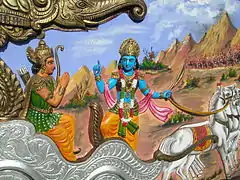Mokshada Ekadashi
Mokshada Ekadashi is a Hindu holy day, which falls on the 11th lunar day (ekadashi) of the fortnight of the waxing moon in the Hindu month of Margashirsha (Agrahayana), corresponding to November–December. Hindus, particularly Vaishnavas observe a 24-hour fast in honour of the god Krishna, an avatar of Vishnu.
| Mokshada Ekadashi | |
|---|---|
 | |
| Also called | Margashirsha Mokshada Ekadashi day |
| Observed by | Hindus |
| Type | Hindu |
| Significance | Fasting day |
| Observances | Prayers and religious rituals, including puja to Vishnu and Krishna |
| Date | Decided by the lunar calendar |
As the name itself indicates, Mokshada Ekadashi is a highly auspicious day dedicated to worship of Lord Vishnu - Shri Hari to get rid of all your sins and to achieve moksha or liberation after death.[1] The ekadashi is celebrated on the same day as Gita Jayanti, the day when Krishna gave the holy sermon of the Bhagavad Gita to the Pandava prince Arjuna, as described in the Hindu epic Mahabharata. The 700-verse Bhagavad Gita told at the beginning of the climactic Mahabharata war between the Pandavas and their cousins, the Kauravas at Kurukshetra, deals with a variety of Hindu philosophical ideas.[2][3]
Legend
The legend about Mokshada Ekadashi is narrated by the god Krishna to the Pandava King Yudhishthira in the Brahmanda Purana. Once, a saintly king called Vaikhanasa ruled in the city of Champakanagar with total compassion treating the subjects as his own children. His subjects belonged to the Vishnu-worshipping Vaishnava sect and were very erudite in Vedic knowledge. Once in the night, the king had a dream and saw his late father being tormented in Naraka (Hell), ruled by Yama, the god of death. The king was highly anguished and related this nightmare to his council the next day. He sought their advice as to how to free his dead father and his ancestors from tortures of Hell and grant them moksha (salvation). The council advised the king to approach the omniscient saint, Parvata Muni ("sage of the mountain"). The sage meditated and found the reason for the hellish torture of the king's father. He mentioned that his father had committed the sin of quarrelling with his wife and having coitus with her in her menstrual cycle, in spite of her strong protests. As a solution to rectify the situation, the sage suggested to the king to observe vrata (vow) of the Mokshada Ekadashi day. On Moksha Ekadashi, the king observed the vrata with a complete fast along with his wife, children and relatives with full faith and devotion. The king's religious merit (obtained from the vrata) pleased the gods of heaven, who carried the king's father to heaven. Mokshada Ekadashi is compared with the chintamani, the gem that yields all desires and special merit is achieved by the vrata, by which one can elevate someone from hell to heaven or attain salvation himself.[2][3]
Practices
The complete fast from sunrise on Mokshada Ekadashi to the dawn the next day is observed. People who cannot fast for that period observe a partial fast. Only vegetarian food, especially fruits, vegetables, milk products and nuts, are consumed. Eating rice, beans, pulses, garlic, and onions is prohibited on this day.[2]
Like most ekadashis, the rites involve worship and prayers to Vishnu. On this day, the avatar Krishna is also worshipped. Devotees properly observing the fast are believed to attain moksha after death.[4]
See also
References
- "Mokshada Ekadashi 2018". 31 December 2016.
- Melton 2011, p. 585.
- "Mokshada Ekadasi". ISKCON. Retrieved 26 November 2012.
- Lochtefeld 2002, p. 444.
Bibliography
- Lochtefeld, James G. (2002). The Illustrated Encyclopedia of Hinduism: A-M. ABC-CLIO. pp. 218–19, 226–27, 444. ISBN 9781598842050. Retrieved 22 November 2012.CS1 maint: ref=harv (link)
- Melton, J. Gordon (2011). Religious Celebrations: An Encyclopedia of Holidays, Festivals, Solemn Observances, and Spiritual Commemorations. ABC-CLIO. p. 585. ISBN 9781598842050. Retrieved 22 November 2012.CS1 maint: ref=harv (link)